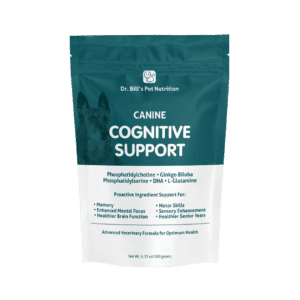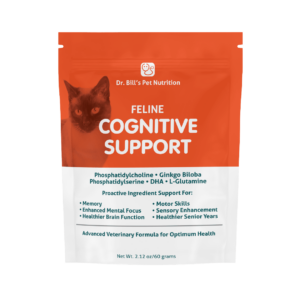
Docosahexaenoic Acid
Docosahexaenoic acid (DHA) is a long-chain, polyunsaturated fatty acid. Of the primary functions associated with the intake of docosapentaenoic acid, the most important is the incorporation of DHA into the phospholipid portion of animal cell membranes. Deficiencies of DHA in experimental animals has led to the production of faulty cellular membranes, lesions of the skin and connective tissues, growth failures, erythrocyte fragility and impaired fertility.
DHA Predominates in the Vital Tissues of our pets
The level of EPA and DHA varies quite substantially in tissues of various animals, and reflects to a very large extent the actual requirement of EPA, DHA or both in maintaining optimal health in those tissues.
Content of EPA relative to DHA in various tissues in dogs and cats
DHA is a primary structural component of nerve, eye, and brain tissue in dogs and cats, and crucial for their proper development and function. This is especially important in cats, since they virtually lack the enzymes to convert Alpha Linolenic Acid (ALA) into EPA and DHA. Experiments in cats showed that even very high levels of ALA gave no detectable level of EPA or DHA in blood phospholipids.
Feeding experiments in cats showed that offspring from cats deprived of DHA had a very low level of DHA in eye and brain tissue and suboptimal retinal function. The same study showed that the addition of 0.2 gram DHA/ kg feed restored the DHA level, indicating a reasonable minimum level of DHA in feline feeds.
Numerous desired effects from feeding DHA to dogs have been shown: They including:
• Prevention of cardiac arrhythmias
• Anti-inflammatory effects
• Alleviation of aggressive behavior
• Joint lubrication
• Improved renal function
• Improve memory and learning in young dogs
Avoid overdosing Omega-3 fatty acids
Feeding high levels of n-3 fatty acids can cause problems with inhibiting the natural inflammatory response to injury and infection. Prolonged feeding of high levels of n-3 fatty acids can also cause bleeding. It is recommended that all anti-inflammatory substances be eliminated prior to surgery of an animal.
Take home message: Make sure your pet gets the right ratio of n-6 to n-3 fatty acids for optimal health
NEW
Subscribe & Save
Save 10% On Auto Deliveries
Shop Now
